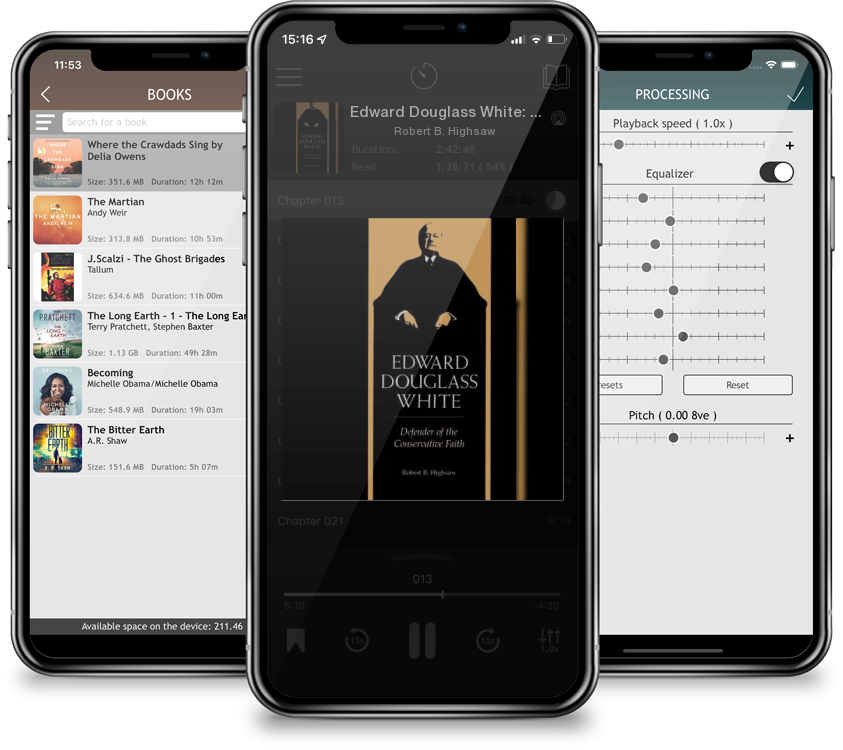Listen to Edward Douglass White: Defender of the Conservative Faith (Southern Biography) by Robert B. Highsaw
Enjoy this audiobook with MP3 Audiobook Player - the ultimate iOS audiobook experience


Elite, personable, and persuasive, Edward Douglass White, a ''large and bearish man from Louisiana, '' served on the United States Supreme Court for twenty-seven years. During his tenure, first as an associate justice (1894-1910) and then as the ninth chief justice (1910-1921), White significantly influenced American public law. Robert Highsaw's extensive judicial biography stresses White's constitutional thought and philosophy. Several chapters discuss his early years in Louisiana, his training in Jesuit schools there and at Georgetown University, and his early legal career in New Orleans. The emphasis, however, remains on White's theories and applications of the judicial and constitutional processes. Edward Douglass White "1ooked upon the American constitutional system as a model for a well-ordered society that must be preserved." White's concept of a federal system in which the national and state governments each operated within a defined sphere of powers underlay many of his opinions. White considered farm issues that developed after the closing of the western frontier, economic issues precipitated by a growing laboring class, and tense political issues of civil liberties that emerged during World War I. He played an important part in developing administrative law and was, perhaps, most responsible for strengthening dual federalism of commerce and taxing powers. His pragmatism, evidenced in the Insular cases where his doctrine of "incorporated" and "unincorporated" territories, synthesized American constitutional law with the political reality of American imperialism. White was a conservative, but unlike the conservative justices of the 1920s and 1930s whose intransigence produced the judicial revolution of 1937, he saw that injury to the Constitution might result from its consistent use as a barrier to social progress. Significantly, Edward Douglass White demonstrates that "the judicial revolution of 1937 and the ensuing decades of the Court's history are meaningless unless we know what happened fifty or so years earlier."
The sheer variety of genres available ensures there's something for everyone. I've been recommending this app to all my friends – it's a true game-changer. I love how this app's user-friendly interface allows me to navigate through chapters and controls effortlessly. With this app, reading is no longer a luxury – it's an essential part of my day. The auto-rewind feature is a small detail that enhances my listening experience. It's these thoughtful touches that matter!
⏰ Early mornings have become my favorite time to listen to audiobooks – energizing! 🌅🎧 🌟 Transforming laundry time into a journey through fantastic stories – thank you, this app! 👚📖 🎧 Carrying a world of literature in my headphones – this app's convenience is truly remarkable. 📚💫 Audiobook immersion without fuss – this app's ease of use is commendable. The playback history is a great feature. I can easily revisit my favorite parts.
This app's compatibility with different formats ensures that I never miss out on a great audiobook. The audio quality is excellent, and the interface is intuitive. ListenBook is my go-to app for audiobooks.
I'm addicted to this app's curated playlists and recommendations – they're spot on. This app is my constant companion, making every moment a chance to discover new worlds. I'm blown away by the silky-smooth playback, even for high-quality formats like FLAC. Top-notch performance! Downloading books directly in the app is so easy. Highly recommend!
Audiobooks have become my companions during long hours of household chores. 🎶📚 Enriching my environment with the power of storytelling – audiobooks infuse my home with literary magic. 🎧🏠
ListenBook's commitment to providing a high-quality audiobook experience is truly commendable. Audiobooks made delightful – this app's usability is a breath of fresh air. Kudos to the developers for making this app iOS 16 optimized. It runs like a dream! is a breeze with ListenBook. It's convenient and efficient.
Plays MP3, MP4, OPUS, OGG, FLAC, AWB, M4B, M4A, WMA, AAC formats
Optimized for iPhone, iPad, and iPod with seamless integration
Adjust playback speed from 0.5x to 3.0x for your listening preference
Import audiobooks via iTunes, cloud services, or direct downloads
Get your favorite audiobooks in supported formats from various sources
Import audiobooks to MP3 Audiobook Player using multiple methods
Control playback from your device, headphones, Apple Watch, or CarPlay
Join thousands of users who enjoy audiobooks with MP3 Audiobook Player daily
Download Now